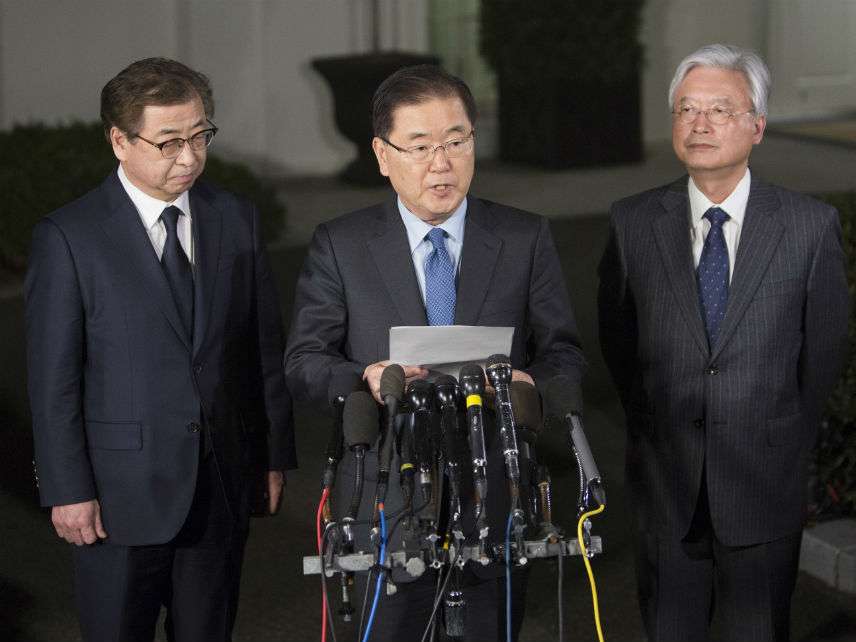Donald Trump to Become First U.S. President to Meet with North Korean Dictator, and Maybe That's Good
Hawks and anti-Trumpers are going bananas at the news, but a rare lunge for peace sounds more promising than the constant threat of war.
On Thursday night, South Korea National Security Adviser Chung Eui-yong abrutptly announced at the White House that North Korean dictator Kim Jong-Un had asked President Donald Trump for face-to-face talks, and that the American had agreed. The White House quickly confirmed the report.
"President Trump greatly appreciates the nice words of the South Korean delegation and President Moon. He will accept the invitation to meet with Kim Jong Un at a place and time to be determined," White House press secretary Sarah Huckabee Sanders said in a statement. "We look forward to the denuclearization of North Korea. In the meantime, all sanctions and maximum pressure must remain."
Kim Jong Un talked about denuclearization with the South Korean Representatives, not just a freeze. Also, no missile testing by North Korea during this period of time. Great progress being made but sanctions will remain until an agreement is reached. Meeting being planned!
— Donald J. Trump (@realDonaldTrump) March 9, 2018
There has been no shortage of skepticism and derision pointed at Trump's move, which would mark the first time a U.S. president has ever met with the head of North Korea, with which Washington is still technically at war. For instance, Naval War College professor and The Death of Expertise author Tom Nichols:
Here's what will happen:
- huge photo op
- propaganda bonanza for NK
- post summit, NK renegs on everything, keeps nukes
- NK blames US
- wasted time buys progress to ICBMs
- US looks like saps, allies facepalm
- nuclear NK, Kim looks like a global badass, US looks like chumps— Tom Nichols (@RadioFreeTom) March 9, 2018
Middlebury Institute of International Studies Professor Jeffrey Lewis lays out in a mini-tweetstorm the credentialed objection: "North Korea has been seeking a summit with an American president for more than twenty years. It has literally been a top foreign policy goal of Pyongyang since Kim Jong Il invited Bill Clinton," Lewis writes. "To be clear -- we need to talk to North Korea. But Kim is not inviting Trump so that he can surrender North Korea's weapons. Kim is inviting Trump to demonstrate that his investment in nuclear and missile capabilities has forced the United States to treat him as an equal."
Call me inexpert (accurately enough!), but I am so far failing to see a problem that outweighs the sliver of opportunity here.

This news comes out of the best possible generator of Korean-peninsula peace ideas: direct and unmediated talks between North and South (characterized here by the Washington Post as "the latest surprising development in a burst of diplomacy that both Koreas hope will stave off threats from the United States"). At those meetings the Norks reportedly expressed a desire for mutual denuclearization, normalized relations, and a lack of military provocations in the meantime.
It's important to recognize that—however much one dislikes the president and his foreign policy ideas—Donald Trump has been very consistent about two things when it comes to a nuclearizing North Korea: 1) It is primarily a problem for North Korea's immediate neighbors, and 2) the U.S. will be happy to threaten maximum force/craziness as necessary to prod NoKo & Co. to the negotiating table.
At the February 2016 GOP presidential debate in New Hampshire, at which the Jeb Bushes and John Kasichs were happy to skylark about "regime change" and pre-emptive strikes, Trump suggested we "let China solve that problem." At a general election debate with Hillary Clinton in Las Vegas, Trump asserted flatly that he "would certainly not do first strike," though he wouldn't "take anything off the table" (and anyway, "China should solve that problem for us"). Two bombing expeditions last spring—the "Mother of All Bombs" dropped over Afghanistan, and the missile attack on a Syrian airfield—were, by many reports, part of a deliberate campaign of "strategic unpredictability" designed above all to influence the decision-making process in Korea.
This approach certainly has its drawbacks. Threatening "fire and fury" on North Korea, as Trump did last August, not only incentivizes the Hermit Kingdom to speed up its own nukes, but it whips the American public into a war-frenzy. It's not hard to see how such a gambit could go horribly wrong, particularly given a political class in which respected statesmen such as Sen. Lindsey Graham (R-S.C.) can say with a straight face such madness as, "All the damage that would come from a war [with North Korea] would be worth it in terms of long-term stability and national security."
It is also not hard to imagine the Tom Nichols scenario—lots of naïve diplomacy, photo ops, and then some months later we learn that the new Horror Missile is that much closer to being operational for a strike on Maui. But what exactly, in that scenario, is lost? A few months of our innocence?
Here are the alternative scenarios served up by American politics over the past 25 years of slow-build nuclearization, ongoing starvation, and sputtering diplomacy: A Sen. John McCain (R-Ariz.), who thinks it's a swell idea to threaten North Korea with "extinction." A then-President George W. Bush, who includes the country in his "Axis of Evil" speech that foreshadowed the Iraq War. A Democratic veep candidate Tim Kaine saying, "Look, a president should take action to defend the United States against imminent threat. You have to."
The world's lousiest country, run by paranoid murderers, has responded to all this by pursuing nukes at the cost of most everything else. Is there a chance Kim Jong-Un would trade that fear for slightly more security and some more trade money coming in? Probably not, but maybe! And I have a hard time seeing the better alternative critics of this move have in mind.


Show Comments (129)